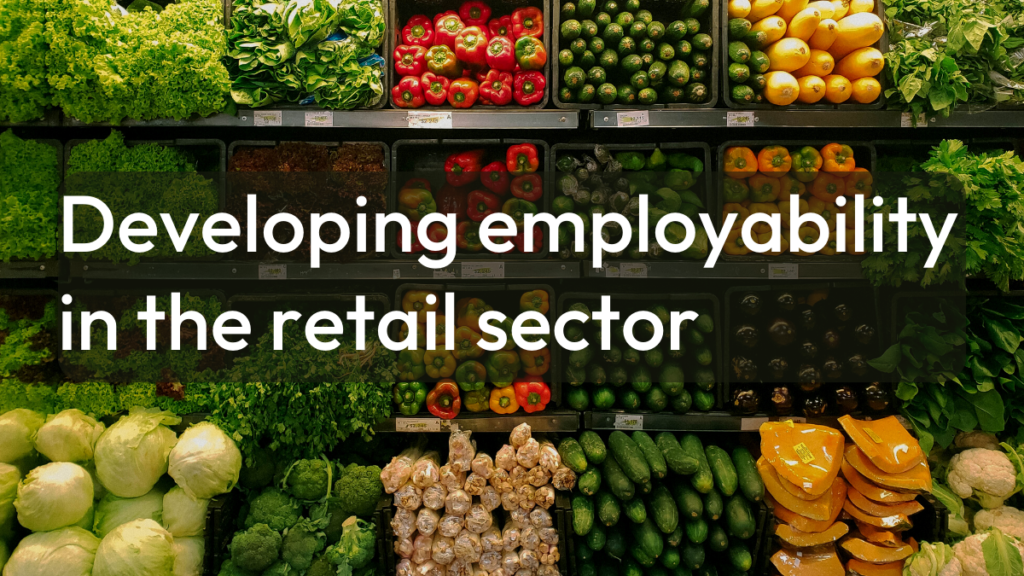Kayleigh White is an Employer Engagement Administrator, and Sunny Lalli is an Employability and Careers Consultant, both are part of the University of Exeter’s Student Employability & Academic Success team, based on our Penryn Campus.

Retail is a sector that is historically underrepresented by University of Exeter graduates and yet in my conversation with Kayleigh, who draws on her experience of working in the retail sector, formerly in retail leisure and latterly as an independent bookshop book seller, we unearth many compelling reasons for working in the retail sector and how this sector can develop valuable transferable employability skills pertinent to graduate roles in sectors beyond retail.
Sunny: Retail is a sector that sometimes our graduates overlook as a destination. What attracted you to retail?
Kayleigh: I think to be honest, I really wanted to get some experience where I’d be just talking and working with people, which is a really important skill that translates into so many jobs, and in retail it’s a very unique experience in that you get one-on-one customer interactions where you have to problem solve on the spot right there and then. So, during sixth form, I joined Build-a-Bear where I eventually progressed to a supervisory management role. The work was rewarding but mentally and physically challenging, and yet I acquired knowledge of brand identity, customer service, working with different demographics which has informed my current role in higher education administration.
‘I would say that the people skills and the problem-solving skills that I handle every single day in my job in events delivery directly harnesses my retail experience.’
Sunny: It sounds as if you feel your previous experience in retail feeds into your current graduate role in higher education administration. Can you tell us more about the relationship between your former and current role?
Kayleigh: My current role is, in part, about employer engagement, which involves liaising with external and internal stakeholders. I speak to companies who are coming in to talk to our students and plan events delivery from start to finish. This involves communicating constantly with the employers that are attending and planning logistics around room bookings, catering, timings, promoting the events through newsletters and social media output. The other dimension of my role is processing placements for outward bound students. I would say that the people skills and the problem-solving skills that I handle every single day in my job in events delivery directly harnesses my retail experience. In my current role I handle a high volume of emails; replying to emails is a form of customer services responding to requests. Speaking constantly on busy shop floors has given me the confidence to interact with colleagues, clients, customers and stakeholders through both digital and in-person means.
Sunny: Why do you think some people are deterred from working in retail, either as a part-time job during studies or as graduate destination such as through a one of the supermarket graduate schemes?
Kayleigh: I think it can be an intimidating sector. It’s fast-paced, busy, requires problem solving under pressure with tight time constraints. There’s a lot of different plates that you’re juggling. It can be daunting but it’s important to remember that you probably already have the required skills, but just have not quite perfected them yet.
Sunny: What do you feel is the main selling point, no pun intended, of working in the retail sector?
Kayleigh: I think retail gives you a source of achievement and I really loved being able to help people, providing people with an experience, personalised recommendations such as a suggested book to read that may shape a person’s perspective. Sure, the quality of that feedback experience will vary according to the size of the retailer and the type of products involved. Many retailers, especially larger ones, run award schemes to praise staff going above and beyond. The built-in recognition of efforts and excellence can offer powerful incentives.
‘Many retailers, especially larger ones, run award schemes to praise staff going above and beyond. The built-in recognition of efforts and excellence can offer powerful incentives.’
Sunny: It sounds as if the retail sector presents opportunities for easy wins of acquiring evidence of measurable and quantifiable micro-achievements which can populate a CV, application form and interview conversation.
Kayleigh: Definitely! One of the items that I put on my CV when I applied for my graduate job was mention of my awards at Build-a-Bear and the achievement scores of 95% success rates on mystery shopper inspections. Working in a shop I was able to present sales data and completion of measurable targets, which could be used in interviews ranging from higher education professional roles to applications for investment banking graduate schemes.
Sunny: Wrapping up, we’ve covered a range of benefits of working in the retail, what you feel are the top five selling points (pun intended) of this sector?
Kayleigh: Top benefit is developing problem-solving skills in tandem with working with a diverse group of people, as well as leadership and experience of rapid progression which is strong characteristic of retail. I think back to my time at Build-a-Bear and how within a short period of time I was able to progress from assistant to supervisor. My final recommendation, I would say, is how retail offers an accessible entry point to experience the culture of a workplace and the standards expected of you. So, yes, I would recommend the retail sector as a place to consider for opportunities to develop!
